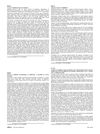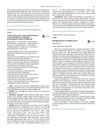 1 citations,
June 2021 in “Journal of gynecology and womens health”
1 citations,
June 2021 in “Journal of gynecology and womens health” The study found that PCOS affects about 6.5-6.8% of women in both urban and rural areas of Telangana, India, and highlighted the importance of lifestyle changes for management.
 January 2019 in “Egyptian Journal of Obesity, Diabetes and Endocrinology”
January 2019 in “Egyptian Journal of Obesity, Diabetes and Endocrinology” People with polycystic ovary syndrome often have low levels of vitamin D.
 February 2024 in “Actas dermo-sifiliográficas/Actas dermo-sifiliográficas”
February 2024 in “Actas dermo-sifiliográficas/Actas dermo-sifiliográficas” Most alopecia areata patients in the study were women, aged 15-49, with patchy hair loss and often had other health conditions.
 31 citations,
April 2019 in “Experimental and Therapeutic Medicine”
31 citations,
April 2019 in “Experimental and Therapeutic Medicine” β-blockers can cause skin problems like psoriasis and vitiligo, and doctors should tell patients about these risks.
 March 2014 in “Journal of the American Academy of Dermatology”
March 2014 in “Journal of the American Academy of Dermatology” Alopecia areata is relatively common in children, has a variable course, and shows different responses to treatment; thyroid testing is recommended for those affected.
 August 2024 in “Frontiers in Public Health”
August 2024 in “Frontiers in Public Health” Alopecia Areata severely impacts mental health, causing anxiety and depression, affecting quality of life.
 815 citations,
April 2010 in “The Journal of Clinical Endocrinology & Metabolism”
815 citations,
April 2010 in “The Journal of Clinical Endocrinology & Metabolism” Women with PCOS should be screened for heart disease risk and manage their health to prevent it.
 418 citations,
June 2003 in “Endocrine Reviews”
418 citations,
June 2003 in “Endocrine Reviews” While PCOS might increase the risk of heart disease, there's not strong evidence to prove it causes earlier heart problems.
 150 citations,
October 2012 in “Clinical Endocrinology”
150 citations,
October 2012 in “Clinical Endocrinology” Women with PCOS have a higher risk of diabetes and heart problems, especially when they get older.
 110 citations,
September 2010 in “Journal of The American Academy of Dermatology”
110 citations,
September 2010 in “Journal of The American Academy of Dermatology” Hair loss linked to higher heart disease risk in both men and women.
 60 citations,
April 2003 in “Human Reproduction”
60 citations,
April 2003 in “Human Reproduction” Young Czech women with PCOS have a higher risk of heart problems and should be regularly checked for cholesterol and glucose issues.
 46 citations,
December 2007 in “International Journal of Cardiology”
46 citations,
December 2007 in “International Journal of Cardiology” People with polycystic ovary syndrome may have a higher risk of heart problems due to abnormal nervous system control of their heart and blood pressure.
 31 citations,
November 2014 in “Journal of Endocrinological Investigation”
31 citations,
November 2014 in “Journal of Endocrinological Investigation” Women with androgen excess, especially those with PCOS, have a much higher risk of heart disease and stroke.
29 citations,
May 2016 in “Journal of the American Academy of Dermatology” Patients with alopecia areata might have a lower risk of stroke and possibly heart attack.
 26 citations,
June 2016 in “Journal of Reproductive Immunology”
26 citations,
June 2016 in “Journal of Reproductive Immunology” Women with PCOS have higher xanthine oxidase activity linked to inflammation and heart disease risks.
 15 citations,
August 2008 in “Toxicology Letters”
15 citations,
August 2008 in “Toxicology Letters” High doses of minoxidil can harm marmoset hearts and kidneys, possibly affecting humans similarly.
 15 citations,
November 2002 in “Cardiology in Review”
15 citations,
November 2002 in “Cardiology in Review” Cardiovascular drugs can cause various skin problems, so recognizing these reactions is important.
 14 citations,
March 2016 in “Journal of Dermatology”
14 citations,
March 2016 in “Journal of Dermatology” Hair loss links to high blood pressure, high fat levels, and metabolic issues, suggesting early heart disease screening.
 13 citations,
November 2015 in “Blood Pressure”
13 citations,
November 2015 in “Blood Pressure” Hair loss may indicate higher heart risk and metabolic issues.
 7 citations,
January 2016 in “Clinical Hemorheology and Microcirculation”
7 citations,
January 2016 in “Clinical Hemorheology and Microcirculation” AGA patients have higher heart disease risk.
 5 citations,
April 2014 in “Journal of Obstetrics and Gynaecology Research”
5 citations,
April 2014 in “Journal of Obstetrics and Gynaecology Research” Young Indian women with PCOS have a higher risk of heart disease, not linked to thyroid function but to higher levels of certain fats and homocysteine.
 4 citations,
January 2019 in “Therapeutic Advances in Endocrinology and Metabolism”
4 citations,
January 2019 in “Therapeutic Advances in Endocrinology and Metabolism” Medications for PCOS don't seem to raise heart disease risk.
3 citations,
May 2013 in “PubMed” Research on Hutchinson-Gilford progeria syndrome could help understand normal aging and heart disease.
 2 citations,
April 2023 in “Pharmaceuticals”
2 citations,
April 2023 in “Pharmaceuticals” Testosterone therapy for postmenopausal women appears safe and may protect against heart disease, but requires constant monitoring and more research for long-term effects.
 2 citations,
May 2017 in “Maturitas”
2 citations,
May 2017 in “Maturitas” Women with premature ovarian insufficiency have a worse cardiovascular risk profile than premenopausal women.
 April 2020 in “The FASEB Journal”
April 2020 in “The FASEB Journal” Testosterone increases heart and blood pressure issues in rats with endotoxemia, and stopping testosterone production can reduce these problems.
 February 2020 in “Biophysical journal”
February 2020 in “Biophysical journal” Zebrafish with mutations similar to human Cantú Syndrome have heart cells with altered channel properties, making them a good model to study the condition.
 January 2020 in “International Journal of Research”
January 2020 in “International Journal of Research” High testosterone increases heart disease risk in women with PCOS.

Nourkrin® with Marilex® may significantly increase hair growth and alopecia could be an early sign of metabolic syndrome.
 January 2013 in “Yearbook of Urology”
January 2013 in “Yearbook of Urology” The Princeton III Consensus recommends assessing cardiovascular risk in men with erectile dysfunction and prioritizing heart health before treating ED, especially in those with potential heart disease.



























